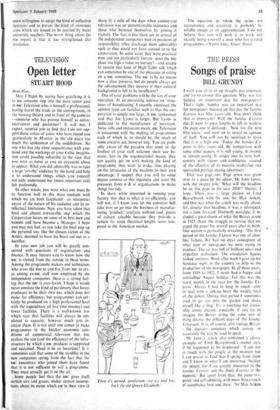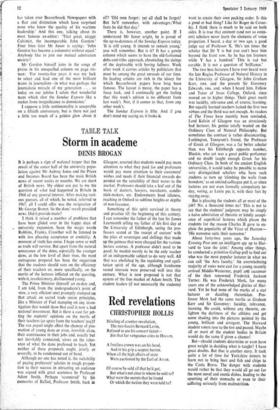Songs of praise
THE PRESS BILL GRUNDY
I want you all to sit up straight, pay attention, and try to answer this question. Why was last Sunday an important day for newspapers?
That's right. Sunday was an important day for newspapers because on that day the Sunday Express was fifty years old. You don't think that is important? Well the Sunday Express did. It went to great lengths to tell its readers. On page one it declared : 'Now for the next fifty years,' and went on to reveal its opinion of- itself. You will not be surprised to learn that it is a high one. 'Today the Sunday Ex- press is fifty years old. By comparison with some other papers, it is still young. It intends to remain young. It strides into its next half- century with vigour and confidence, assured of the affection of its massive readership and unrivalled prestige among advertisers.'
That was page one. Page seven was given over to a piece by the editor, Mr John Junor, with the snappy title, 'What will the headline be on this page in the year 2018?' Shorter, I hope. There was a large picture of Lord Beaverbrook with his son, Sir Max Aitken, and that was what the article was really about, for, despite that headline, it was a retrospect, not a look forward. Distinctly nostalgic, it in- cluded a great chunk of what the Beaver wrote in 1925 about the struggle to survive that en- gaged the paper for several years after its birth. One section is particularly revealing: 'The first period of the Sunday Express was one of abso- lute failure. We had no clear conception of what type of newspaper we were trying to produce. The air was full of brilliant ideas and imperfect realisation. The circulation figures looked ominous. Week after week I gave up my Saturday night in the country to help in the production of the newspaper. In all those years, from 1919 to 1922. I never had a happy and untroubled August holiday. For this was the worst month in the year for the Sunday Ex- press. Always I had to keep in touch—only to read with a sinking heart the weekly total of the deficit. During that period I sometimes used to go out into the garden and shake myself like a dog.' It's a touching but irresis- tibly comic picture, especially if you try to imagine the Berrys doing the same sort of thing during the difficult days of the Sunday Telegraph. It is, of course, also vintage Beaver --the staccato sentences which convey so accurately the way he used to speak.
Mr Junor's article also contained a classic example of Lord Beaverbrook's memo style if he happened to be displeased : 'I am not in touch with the people at the moment but I can praise to God that I spring from them and I know in what I am interested. Neither the people nor I are greatly interested in the. Sunday Express and the Daily Express at the moment.' But apart from that, the piece was gooey and self-admiring, with more than a touch of sycophancy here and there: 'Sir Max Aitken
has taken over Beaverbrook Newspapers with a flair and distinction which have surprised none who knew the quality of his wartime leadership.' And this one, talking about its most famous ex-editor: 'That great, craggy Calvinist, the incomparable John Gordon' Four lines later Mr Junor is saying: 'John Gordon has become a columnist without equal.' Anybody like to join our mutual admiration society?
Mr Gordon himself joins in the songs of praise in his unequalled column on page six- teen : 'For twenty-five years it was my luck to select and lead one of the most brilliant teams in journalism—in what was perhaps the journalistic miracle of my generation . . . so today on our jubilee I salute that wonderful team which shot the Sunday Express like a rocket from insignificance to dominance.'
I suppose a little sentimentality is acceptable on a fiftieth anniversary, but is there not just a little too much of a golden glow about it
all? 'Old men forget: yet all shall be forgot/ But he'll remember, with advantages/What feats he did that day.'
There is, however, another point. If I understand Mr Junor aright, he is proud of the up-to-dateness of the Sunday Express today. 'It is still young. It intends to remain young,' you will remember. But is it? It has a gossip column which seems to have the old-fashioned debs-and-titles approach, chronicling the doings of the deplorable with boring fullness. Week after week it carries articles by politicians that must be among the great unreads of our time. Its leading articles are rich in the idiocy for which Beaverbrook papers have long been famous. The layout is messy, the paper has a fussy look, and I continually get the feeling that this week's edition is no different from last week's. Nor, if it comes to that, from any other week's.
The Sunday Express is fifty. And if you don't mind my saying so, it looks it.



































 Previous page
Previous page